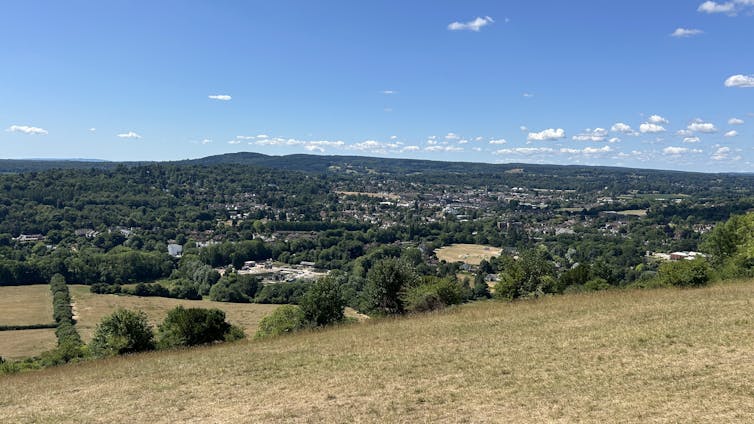- Home
Edition
Africa Australia Brasil Canada Canada (français) España Europe France Global Indonesia New Zealand United Kingdom United States Edition:
Global
Edition:
Global
- Africa
- Australia
- Brasil
- Canada
- Canada (français)
- España
- Europe
- France
- Indonesia
- New Zealand
- United Kingdom
- United States
 Academic rigour, journalistic flair
Academic rigour, journalistic flair
 Jane Austen’s friends shaped both her life and her writing.
The Granger Collection
Jane Austen’s friendships defied social class – and empowered her writing
Published: November 25, 2025 10.06am GMT
Anna Walker, The Conversation, Jane Wright, The Conversation, Bharat Tandon, Emma Claire Sweeney, Janet Todd
Jane Austen’s friends shaped both her life and her writing.
The Granger Collection
Jane Austen’s friendships defied social class – and empowered her writing
Published: November 25, 2025 10.06am GMT
Anna Walker, The Conversation, Jane Wright, The Conversation, Bharat Tandon, Emma Claire Sweeney, Janet Todd
Authors
-
 Anna Walker
Anna Walker
Senior Arts + Culture Editor
-
 Jane Wright
Jane Wright
Commissioning Editor, Arts & Culture, The Conversation UK
Interviewed
-
 Bharat Tandon
Bharat Tandon
Lecturer, School of Literature, Drama and Creative Writing, University of East Anglia
-
 Emma Claire Sweeney
Emma Claire Sweeney
Senior Lecturer In Creative Writing, The Open University
-
 Janet Todd
Janet Todd
Seventh President of Lucy Cavendish College, Honorary Fellow of Lucy Cavendish and Newnham Colleges, University of Cambridge; University of Aberdeen
Partners
View all partners
DOI
https://doi.org/10.64628/AB.yajpp5ur6
https://theconversation.com/jane-austens-friendships-defied-social-class-and-empowered-her-writing-270144 https://theconversation.com/jane-austens-friendships-defied-social-class-and-empowered-her-writing-270144 Link copied Share articleShare article
Copy link Email Bluesky Facebook WhatsApp Messenger LinkedIn X (Twitter)Print article
Jane Austen’s Paper Trail is a podcast from The Conversation celebrating 250 years since the author’s birth. In each episode, we’ll be investigating a different aspect of Austen’s personality by interrogating one of her novels with leading researchers. Along the way, we’ll visit locations important to Austen to uncover a particular aspect of her life and the times she lived in. In episode 4, we look at who were Austen’s friends, and ask what we can learn about friendship in the pages of her fourth novel, Emma.
When she created the “handsome, clever and rich” Emma Woodhouse, Jane Austen wrote that she suspected this was a character “no one but myself will much like”. It’s difficult to disagree with her assessment, and yet Emma endures as a flawed heroine with whom readers want to stay the course, shortcomings and all.
Pretty, witty, arrogant and spoilt, Emma has spent her 21 years in the lap of luxury with little to trouble her. That is, until she makes a friend and protegee of Harriet Smith, a young woman of sweet disposition and lesser social standing. There begins a highly entertaining and often twisty tale of love, friendship, secrets, crossed wires, social faux pas and satisfying comeuppances. It all plays out against the social landscape of Highbury, where wealth, class and hierarchy are merciless yardsticks of people’s local standing.
Nowhere is this more acutely observed than at a picnic gathering at Box Hill in Surrey, where Emma is at her most thoughtless. During a game of wit, she mocks the sweet but dull Miss Bates, a spinster living in genteel poverty who has long considered Emma a friend. Watching Emma humiliate this harmless creature in front of their social circle, George Knightley, the novel’s moral compass, reacts with disgust and disappointment. This incident sparks reflection and self-awarness in Emma, and she resolves to do better.
In the fourth episode of Jane Austen’s Paper Trail, The Conversation’s Jane Wright visits Box Hill with Emma Claire Sweeney, senior lecturer in creative writing at the Open University and expert in Austen’s friendships. We explore who Austen’s friends were, the significance of these relationships in her life, and how she depicted female friendship in her novels.
 The view from the top. Jane Wright and Emma Sweeney visited Box Hill in Surrey.
Jane Wright, CC BY
The view from the top. Jane Wright and Emma Sweeney visited Box Hill in Surrey.
Jane Wright, CC BY
In her book The Secret Sisterhood (2017), Sweeney wrote about Austen’s friendship with Anne Sharp, a governess who worked for her brother Edward. Crucially, Sharp was also a writer, which strengthened the bond between the two women. But it was a friendship that Austen’s family played down and concealed after her death.
“In Anne Sharp,” explains Sweeney during our interview, “Jane had a class-defying friendship that wasn’t really known about until the 1920s. But it was hugely important to Jane to have a friend she could talk to about writing, for although she was surrounded by her sister Cassandra, her friend Martha Lloyd and her mother who loved to discuss books, they were not writers. And while Anne Sharp was a very different kind of writer, she was a writer Jane valued.”
Later on, Anna Walker sits down with two more eminent Austen experts to discuss friendship in Emma – emeritus professor Janet Todd of Cambridge University, and Bharat Tandon, lecturer in literature at the University of East Anglia.
As Tandon explains, Austen’s relationship with her sister Cassandra was the closest of her friendships. Cassandra and their shared friend (and eventual sister-in-law) Mary Lloyd formed Austen’s “intellectual and comic focus group,” offering feedback on her writing.
But not everyone in Austen’s day saw female friendship as a positive force. “The idea of an intellectual and emotional connection between women worried men,” Todd explains. “It seemed to be working against the important tie of heterosexual marriage, and so it was something that needed to be controlled.”
Listen to episode 4 of Jane Austen’s Paper Trail wherever you get your podcasts. And if you’re craving more Austen, check out our Jane Austen 250 page for more expert articles celebrating the anniversary.
Disclosure statement
Emma Claire Sweeney, Bharat Tandon and Janet Todd do not work for, consult, own shares in or receive funding from any company or organisation that would benefit from this article, and have disclosed no relevant affiliations beyond their academic appointment.
Jane Austen’s Paper Trail is hosted by Anna Walker with reporting from Jane Wright and Naomi Joseph. Senior producer and sound designer is Eloise Stevens and the executive producer is Gemma Ware. Artwork by Alice Mason and Naomi Joseph.
Listen to The Conversation Weekly via any of the apps listed above, download it directly via our RSS feed or find out how else to listen here.
- Audio
- Friendship
- Podcasts
- Jane Austen 250
- Jane Austen's Paper Trail
Events
Jobs
-
 Case Specialist, Student Information and Regulatory Reporting
Case Specialist, Student Information and Regulatory Reporting
-
 Lecturer in Paramedicine
Lecturer in Paramedicine
-
 Associate Lecturer, Social Work
Associate Lecturer, Social Work
-
 Lecturer, Communication Design
Lecturer, Communication Design
-
 Leading Research Centre Coordinator
Leading Research Centre Coordinator
- Editorial Policies
- Community standards
- Republishing guidelines
- Analytics
- Our feeds
- Get newsletter
- Who we are
- Our charter
- Our team
- Partners and funders
- Resource for media
- Contact us
-
-
-
-
Copyright © 2010–2025, The Conversation
 Case Specialist, Student Information and Regulatory Reporting
Case Specialist, Student Information and Regulatory Reporting
 Lecturer in Paramedicine
Lecturer in Paramedicine
 Associate Lecturer, Social Work
Associate Lecturer, Social Work
 Lecturer, Communication Design
Lecturer, Communication Design
 Leading Research Centre Coordinator
Leading Research Centre Coordinator